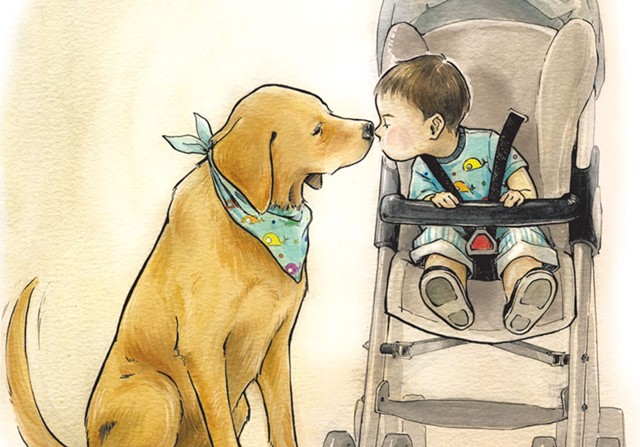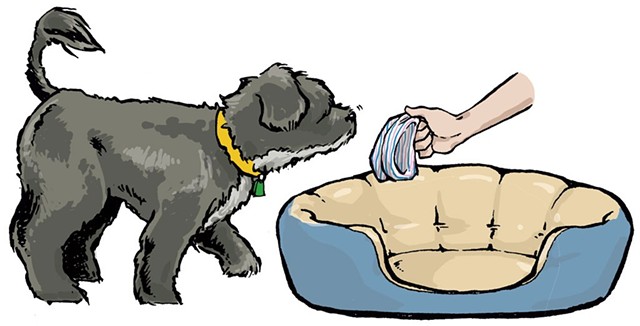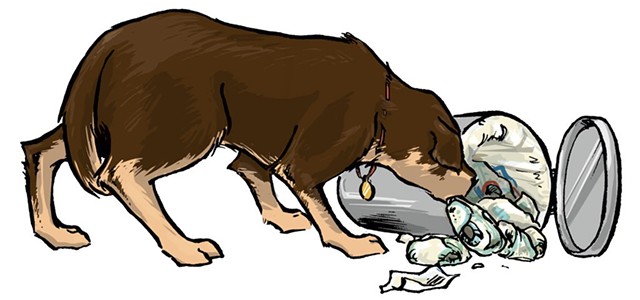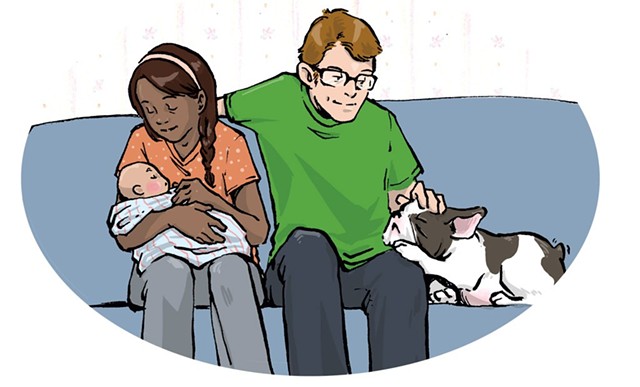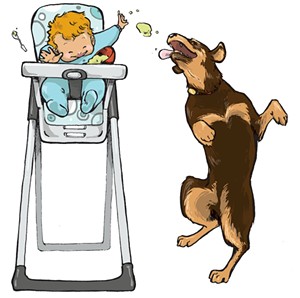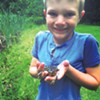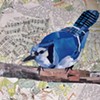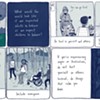Published June 30, 2015 at 10:00 a.m.
Last May I was out for a walk with my dog and week-old son when we ran into a friend. She peered into the baby carrier at Russell, then patted my dog on the head. "Sorry, Josie," she said to our scrappy mixed-breed. "You've been demoted."
Over the course of my pregnancy, people asked my husband and me if we were prepared for the transition from pet owners to parents — and the inevitable shift in our focus. "How do you think Josie's going to take it?" they asked. We didn't know the answer.
Like many Vermonters, we are dog people. Like, in love with our dog. When Josie got a muscle cramp in her tail from swimming too long in the river two summers ago, I spent hours pressing a heating pad against her rump. When my husband traveled for work, I'd sleep on the futon, spooning hairy, smelly Josie.
Josie has been our baby — and our adventure companion, couch snuggler and sometime Facebook profile picture — for the last five years. But we knew that a human baby would trump the canine variety. Leading up to Russell's birth, we worried that Josie might become an afterthought or, worse, an inconvenience. We didn't want her feeling jealous or threatened, and we knew she would continue to need exercise and attention.
Being a dog owner with a new baby requires work, patience and intuition. Figuring out the dynamic isn't always easy, but it can help your new family bond.
"The priorities change so much," acknowledges Dr. Simone Kratochvil-Meertens, a veterinarian at South Burlington's Green Mountain Animal Hospital. "But [dogs are] still part of the family, and they need to be treated that way."
A Proper Introduction
First impressions are critical when dog meets baby. Dogs don't like surprises and, when startled, may react aggressively. With a little planning, though, parents can ease a pooch into the reality of having a new family member, and even help the dog understand and embrace its big-sibling role.
Kratochvil-Meertens suggests that parents use the cap their infant wears right after birth to help a pup acclimate to the new baby's scent. "Bring it home and put it in the dog bed," she says.
Erin Hurley and Noah Derman took that recommendation to heart. After their daughter, Rosa, was born at Gifford Medical Center in Randolph, they gave the baby's hat to Puff, their fluffy chow-shepherd rescue. "Puffy was insanely interested in this hat, sniffing it, carrying it around," Hurley recalls. "He knew it had something to do with me and Noah."
When Rosa came home, Puff put two and two together. "Five minutes after he met her, he tore a tennis ball to shreds," says Hurley. "That was his entire anxiety about this child. Then it was over, and we were perfectly happy."
Huntington parents Pete and Keri Hess took a different tack. Knowing their Great Pyrenees, Lily, was from a herding breed, they introduced their son, Will, as a new member of her flock. Under their supervision, they let Lily sniff and watch the baby, while giving the dog plenty of attention.
"Once she saw Will was part of the family, it was business as usual for Lily. She became just as serious about being a guardian for Will as she was for us," says Pete. "It may have been my imagination, but I almost feel like she took her role more seriously with the new baby around. When other dogs are around, Lily will keep an eye on Will in case any of the other dogs get too close to him."
Growing Pains
Even if the first introduction goes well, you can't always predict how your dog will react to a new baby, says Robyn Santor, owner of Spirit Dog training in Winooski. After her daughter, Etta, was born, her two dogs had starkly different reactions. Cooper, a Lab mix, was interested in the baby, but Olive, an American bulldog mix, kept her distance. Instead of forcing Olive to interact with the baby, Santor gave the dog space to come to terms with the change.
"It's important for them to have a place to go where they can be away from it, if they want to be," she says. By now, both dogs are used to having Etta around, but Santor still protects their space. She won't let her crawling daughter treat the dogs like toys. "My daughter wants to grab and yank on everything," she says. Setting up an unrealistic expectation that all dogs will tolerate such treatment, she reasons, "is not fair to my daughter, and it's not fair to my dogs."
Introducing a new baby can be unsettling even for the most reliable pets. Dog owners are likely to find themselves redirecting behaviors and enforcing new boundaries.
Julia and Tom Rogers of Stowe own Sylvester, an elderly rottweiler-malamute mix with a regal bearing and generally good manners. But when baby Nora arrived last year, Sylvester registered his skepticism in a way he knew they would understand.
"The night we brought Nora home, he threw up three times in our bedroom and stole food off the counter," Julia says. "Then he got to the diapers." The dog managed to get into the diaper pail and rip open dirty ones.
Burlington parents Kianna and Sam Bromley had an equally stinky problem. Their Portuguese water dog, Abeja, was overly affectionate with their baby, Zöe. "She's almost too loving. She's very lick-y," Bromley says. "We had to push her face away because she eats poop."
The Bromleys also had to change their rules around personal space. In the past, the dog had hopped up on the family bed every morning. But with a new baby to snuggle, the couple suddenly realized the bed wasn't big enough for four.
It wasn't easy reteaching the dog to stay down when she clearly wanted to jump up and cuddle. "Is the baby on the bed or is the dog on the bed? That was hard," recalls Bromley.
Abeja is still allowed on the bed — sometimes. She has to ask first. "We kicked her off a bunch of times, would get her to sit at the base of the bed, and then would invite her up and reward her," says Bromley. "She got it pretty quick, and started to yip to let us know when she wanted to be invited up."
Safety First
Parents with anxious dogs — or dogs with a history of bad behavior — are right to be concerned. Dogs, when stressed, can bite. Fortunately, many behavioral issues can be trained away (see sidebar on page 20).
The No. 1 safety rule: Watch your dog. As canine program coordinator at the Humane Society of Chittenden County, Katelyn Little has been on the receiving end of some sad situations. "The biggest thing we've noticed when dogs are relinquished is there's an instance when the dog and kid were together and weren't supervised," she says.
As babies get older, especially when they begin crawling and walking, they can stress out an otherwise mellow dog. "Children tend to be erratic, and that's when things get hairy," says Tammy Schey, who owns the Crate Escape in Richmond and the Crate Escape Too in South Burlington. "Dogs do give warning signals. They don't bite out of the blue." A watchful adult can intervene before the dog nips — or worse.
Of course, safety works both ways.
Dogs sometimes behave instinctively to keep their pack safe. Our Josie is an unreformed barker, sending up a lusty aroo every time we get a UPS delivery. I was pregnant when my Richmond neighborhood was hit by a series of home invasions this winter, and was grateful to have a canine alarm protecting my turf.
Angie Coyne was pregnant last September when her mastiff mix, Cody, killed a rabid raccoon by the river on her rural Duxbury property. A week later, he killed another one on her front porch.
The dog was vaccinated, but the experience was terrifying. Afraid of contracting the deadly virus, Coyne consulted with an infectious disease specialist, who determined she was at very low risk. "However, at eight months pregnant," Coyne says, "I was literally having zombie nightmares."
Still, without Cody's defense, Coyne thinks it could have been far worse. "I thought he deserved a ribbon for taking out the rabid raccoons of Duxbury," she says. "I was thinking about bringing my baby down to the river the next summer ... I'm glad I have Cody to protect us, because he would never let anything happen to his family."
And Baby Makes Four
As families develop a new rhythm, dogs usually come to accept the change. After she came back from the hospital, Robyn Santor remembers, "For a couple of months, I was a crazy, sleep-deprived person. My schedule was not consistent and we were not doing our regular walk." Reestablishing routines is important, she says. That may mean hiring a dog walker or getting an occasional hand from a friend or family member.
It also helps if there's something in it for Fido. Julia Rogers says Sylvester, the gentleman dog turned diaper diver, figured out that baby Nora can hook him up with snacks. "He likes her a lot more now that she eats food and sits in a high chair!" Rogers says, adding that the first time Nora crawled, it was to Sylvester.
In my house we've worked on praising Josie while Russell nurses and petting her when he fusses.
We also had good timing. Russell was born right as what felt like the longest, coldest winter ever transformed into a gorgeous spring. In these early months, we've spent a lot of time doing Josie's favorite activity: walking. Josie loves the extra exercise, and she's learned to associate the baby with walks. When the Bjorn baby carrier goes on, Josie's by the door, pointing the way.
And, unexpectedly, Russell has brought my husband and Josie even closer. When I feed Russ, which is all the time, they hang out together.
In early June, we went on a family foraging expedition in the woods — the type of activity we've always done with Josie. As Russ slept in his carrier and the dog romped over fallen trees, I realized my fears about Josie feeling left out haven't materialized. This is just what our family looks like now — and all four of us are a part of it.
Bringing Fido Into the Fold
Expecting a baby? Here are some things you can do to help your dog adjust — and signs that you may need a little extra support.
Socialize
Invite over friends with little ones, says Katelyn Little of the Humane Society of Chittenden County: "Socialize your dogs with kids so they understand that they're friends and playful and they're not threats."
Train away bad behaviors now
Work on dog training before you expand your family, says Amanda Poquette, owner of Gulliver's Doggie Daycare in Williston. In the interest of safety and sanity, she says, "You have to make sure your dog has good manners."
Tammy Schey of the Crate Escape agrees. "Do training classes first so you have tips on hand to implement once you have the baby," she recommends.
If you procrastinated on training during pregnancy, don't worry. Just make sure to get any naughtiness worked out while Junior is still a newborn. "In general, you have time to work on stuff because the baby is not mobile," says Dr. Simone Kratochvil-Meertens of Green Mountain Animal Hospital. "Initially it's not a safety concern when the baby comes home. Just never leave them on the floor with the dog. It's not worth the risk."
Signs to watch for
An anxious dog will chew things, says Kratochvil-Meertens, or show increased separation anxiety, barking when you leave the house.
Watch out for clenched teeth, ears folded straight back or visible white space in its eyes, cautions Schey. These things indicate a dog is nervous or agitated.
Practice Inclusion
Poquette recommends saving small chunks of time just for you and your dog. Going for a walk, playing fetch or taking an agility class will reinforce your bond and give you a break from baby duties.
"It's important to not make the dog feel excluded," seconds Kratochvil-Meertens. Give your pooch pats and praise in front of the baby "so the dog understands the new baby in the house is actually a positive thing for him."
This article was originally published in Seven Days' monthly parenting magazine, Kids VT.
More By This Author
Speaking of KidsVT - Features,
-

Can You Dig It? Make Your Own Worm Farm With These Simple Steps
Aug 24, 2021 -

Mr. Fix-It: Marty Spaulding Works Behind the Scenes to Help Students Learn on Campus
Aug 24, 2021 -

Back to School During Delta: A Pediatrician With Young Children Offers a Road Map — and Survival Strategies
Aug 24, 2021 -

How to Savor Vermont's Shortest, Sweetest Season
Jun 29, 2021 -

Good Citizens Rocked the At-Home Challenge
Apr 6, 2021 - More »
Comments
Comments are closed.
From 2014-2020, Seven Days allowed readers to comment on all stories posted on our website. While we've appreciated the suggestions and insights, right now Seven Days is prioritizing our core mission — producing high-quality, responsible local journalism — over moderating online debates between readers.
To criticize, correct or praise our reporting, please send us a letter to the editor or send us a tip. We’ll check it out and report the results.
Online comments may return when we have better tech tools for managing them. Thanks for reading.



































